Published Mar 11, 2020
Smith, Marx, and... Picard?: Star Trek and Our Economic Future
"In every revolution, there's one man with a vision." - Captain James T. Kirk
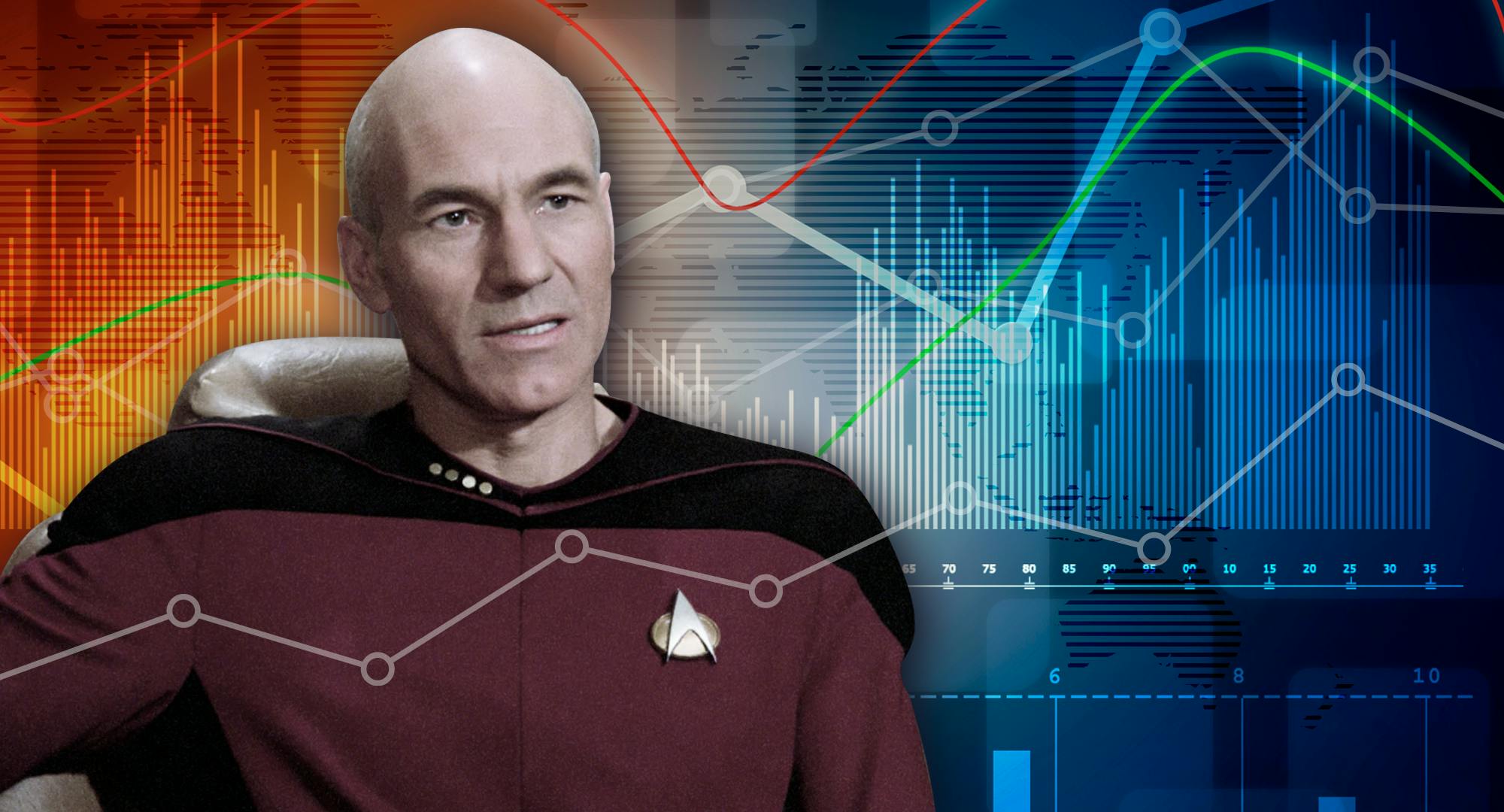
StarTrek.com
What’s the Challenge?
In Star Trek: The Next Generation’s “The Neutral Zone”, Lieutenant Commander Data beams aboard an ancient vessel adrift in space. He soon realizes that it carries cryogenically frozen humans. Data returns to the Enterprise with three of them, who can still be revived. Unlike the bodies of Khan Noonien Singh and his genetically-perfected superhumans in The Original Series episode’“Space Seed”, these are ordinary folks, preserved just as they died from typical ailments circa 1990.
They awaken to find themselves fast-forwarded three and a half centuries into the future. Among them is Ralph Offenhouse, who demands to call his lawyer. He needs to recover his fortune, which, presumably, can still be used for the sport of leveraged buyouts and corporate raids. Captain Picard scoffs, informing him that the very notion of money itself has disappeared. Mr. Offenhouse is beside himself. What’s he going to do now? Picard tells him, “This is the twenty-fourth century. Material needs no longer exist… The challenge, Mister Offenhouse, is to improve yourself. To enrich yourself. Enjoy it.”
Life in the 24th Century
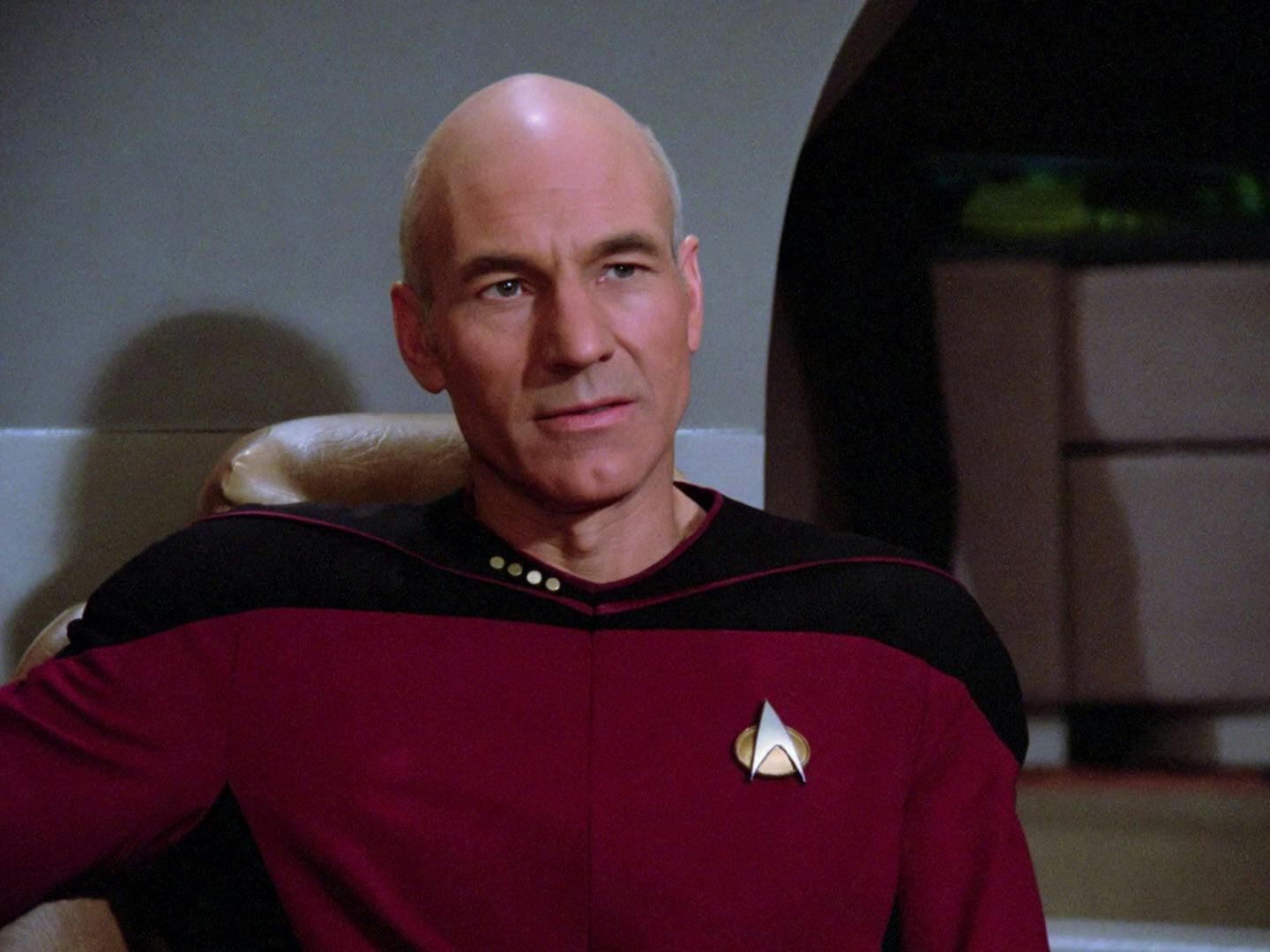
StarTrek.com
And so that 20th-century Earthling got a quick lesson in 24th century “post-scarcity” economics. As Manu Saadia highlights in his book, Trekonomics: The Economics of Star Trek, money is no longer needed because technology has advanced so far that nearly everything is available with the touch of a button. The replicators — accessible by everyone — generate food, clothing, musical instruments, or whatever might be desired. Transportation and communication are instantaneous. Energy is clean and nearly boundless, and computing is used solely for improving the quality of life, rather than for enslavement or fueling hate. Work and employment are purely optional.
Instead of nations, Planet Earth is home simply to Terrans, joined in the United Federation of Planets. The notion of globalization is quaint — there is no need for Americans to worry that the Chinese will take away their factory jobs. There are no Americans nor Chinese, nor are there any factories. People are free to retain their historical cultural identities, or not.
With few restraints at home, people roam the galaxy. Many of the humanoid societies they encounter demonstrate how far humanity has progressed. The violent Klingons are a throwback to a time before the Roman Empire, which has been reincarnated as the Romulan Empire. The Ferengi — guided by their Rules of Acquisition — are greedy 19th century Scrooges. The Cardassians are war-mongering fascists.
Economic Thinking
This futurist vision of peace and plenty was created by Gene Roddenberry, who imagined what was possible if people stopped hurting each other through unchecked selfishness, war, and hate, and, instead, focused on embracing their common humanity. The spark he ignited has formed into a magnum opus in a succession of great works by influential economic thinkers. They have, over the centuries, argued for alternative economic systems aimed to improve humankind. Their works, directly and indirectly, engage in dialogues with past writers — critiquing and arguing with them — and advancing new ideas. Based on these visions, we have implemented our economic realities.
Star Trek represents a work in this chain that began with Adam Smith in the late-18th century. It then led to a pushback by Karl Marx in the mid-19th century. Without mentioning economists by name, the series continues the tradition of arguing for and against parts of Smith and Marx’s respective economic insights. I believe it splits their two approaches down the middle to present a third worldview by offering the best of each economist. TOS and TNG, and to some degree Deep Space Nine (DS9) and Voyager, provide thought experiments to help us imagine a world that manages to be both relatively equal and fair but also prizes the rights of the individual. In short, Star Trek, at its core, argues for a new economic arrangement in the tradition of the best economic thinkers.
Adam Smith
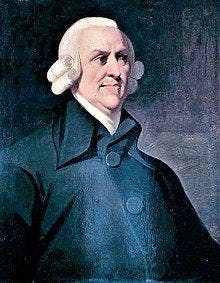
Wikipedia.com
In 1776, by completing his tome, An Inquiry into the Nature and Causes of the Wealth of Nations, the Scottish philosopher, Adam Smith, established for himself the title of “World’s First Economist.” He argued that the material wealth of a nation will grow if it allows its citizens the maximum freedom to pursue their self-interests. The baker bakes not because she is hungry, but because she enriches herself when feeding her neighbors.
Rising incomes emerge through specialization, division of labor, and trade. Money, an essential facilitator, is not, in and of itself, the key element of wealth. You can’t eat gold (or gold-pressed latinum). Instead, productivity — the ability to generate accomplishments — is the real source of wealth. Smith, using the example of a pin factory, showed that one craftsman spending his whole day making pins from start to finish could not make more than a dozen. But if several workers organized to each specialize on one small task — say one heats the metal, another draws it out into wires, and a third cuts them into pins — the three could produce thousands of pins per shift.
But specialization is only profitable if the team can sell what they make. Thus, the marketplace needs to be open to all. Monopolies created either by the state or through corporate mergers, squash competition and innovation, and are harmful to the betterment of humanity. Smith argued, paradoxically, that by freeing the individual to pursue her own goals — via laissez-faire — social order and wealth would naturally emerge — as if guided by an invisible hand. His arguments were rather persuasive. In the early 19th century, nations around the world, in fits and starts, embraced industrialization and free trade.
Enter Karl Marx
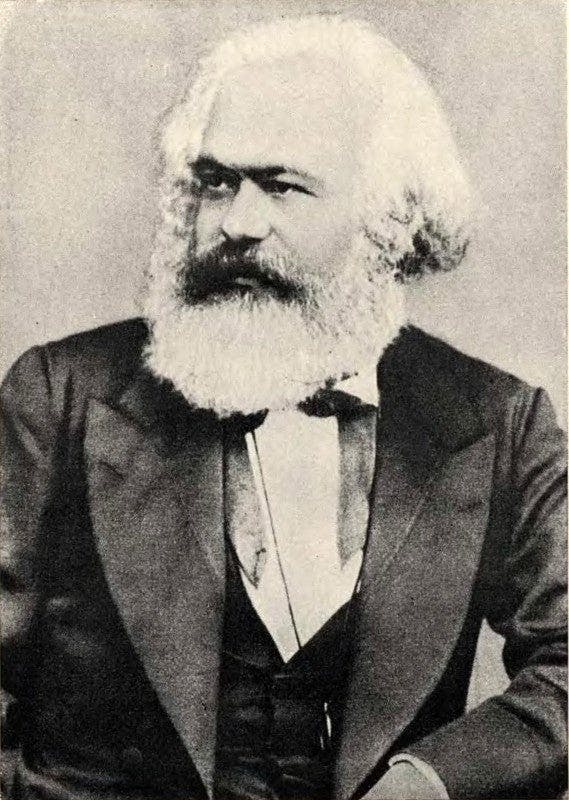
Wikimedia.com
However, obtaining income through large-scale production requires organization by “team leaders” — the capitalists. Their job is to purchase various inputs and see that they are assembled in a manner that generates the most output for the least cost. The capitalists are incentivized to reduce expenses by using machines and deskilling labor. Their bets on new technologies are expensive and need to be first bankrolled by investors.
As the 19th century wore on, the industrializing West began to see a few downsides to Smith’s vision. Perhaps he could never have foreseen the rise of sprawling factories, darkening the air with smoke, and employing armies of lumpenproletariat. Alongside this vast inequality was the whipsaw business cycle. High profits financed more and more production, which generated gluts, which then gave way to factory closures, unemployment, loan defaults, and economic depressions.
The answer, as Marx, saw it, is to use capitalism’s bounty to generate an equal society. In fact, he saw this new world order as a historical inevitability. Fairness, rather than efficiency, was to be prioritized. The workers produce the wealth, therefore, they deserve to have it. The capitalists, on the other hand, create chaos and pay just enough to keep the working class alive. Private property is to be abolished and distribution from the collective soup bowl is to be allocated based on the rule: “from each according to his ability, to each according to his needs.”
For the last century and a half, we have been arguing who was right. While Smith seems to have been pronounced the winner, no nation has a pure free-market economy. Most governments today try to balance what’s good for the individual versus the whole.
Smithian Star Trek
Despite the elimination of material scarcity, the future still retains elements that Smith argued for. Perhaps the most important is the sanctity of the individual and private property. For example, Captain Picard’s family owns their historical vineyards in France, and Commander Benjamin Sisko’s father runs his Creole Kitchen restaurant in New Orleans. The Holographic Doctor in Voyager is awarded a copyright to his holonovel (“Author, Author”). These are cases of the gains from trade that Smith described, and they stem from the freedom of individuals to specialize and hold ownership over, or get credit for, their output.
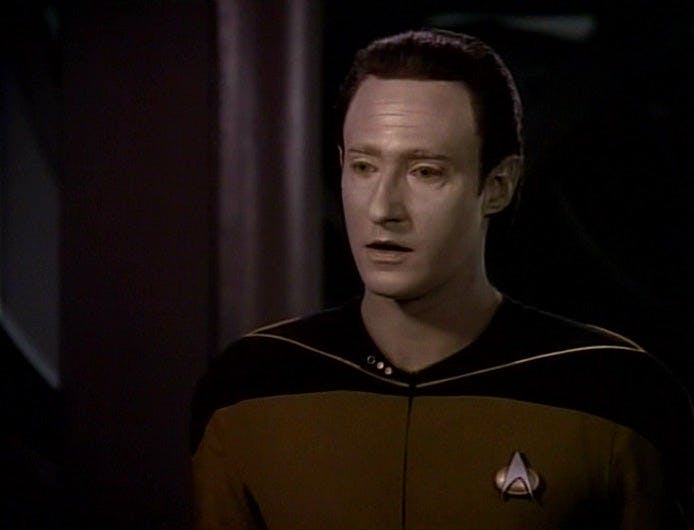
StarTrek.com
Similarly, Data’s battle to prevent himself from being disassembled and studied in “The Measure of a Man” is not just a moral issue but an economic one. Picard helps him win his right of self-determination on the grounds that a potential future army of Data’s could be exploited and enslaved — a system incompatible with a laissez-faire economy.
The Borg are the ultimate communists. For the good of the whole — or the body — there are no individuals. They represent the greatest threat to humanity, both literally and figuratively. The contrast between the Borg collective and the primacy of individual freedom is demonstrated in “I, Borg,” when the Enterprise rescues a dying teenage Borg. On the ship, they encourage him to find his individuality. In the end, the newly named Hugh discovers and cherishes his new identity, but, by necessity, he must abandon it and return to the collective or face death. In “Descent, Part II”, we eventually learn that his individuality spreads like a virus and destroys the hive.
Marxian Star Trek
Despite the importance of the individual in the 24th century, there are many elements of the Marxian economy that technology makes possible. With no material scarcity, there is no money, and the greed it engenders simply melts away. And without money and greed, there can be no exploitation nor economic depressions. The lowliest worker has access to the Earth’s bounty just as the greatest starship captain. Arguably, the obliteration of exploitation is given its highest expression by the Prime Directive, which prohibits members of Starfleet from interfering with the internal development or affairs of alien civilizations.
It is, at heart, an anti-colonialism measure, designed to stop a more technologically advanced culture from the kind of oppression that Marx railed against in the Communist Manifesto. Though Captain Kirk can simply steal dilithium crystals from the Planet Halkan (“Mirror, Mirror”), he does not, for the Prime Directive teaches it is better to be fair than ruthless.
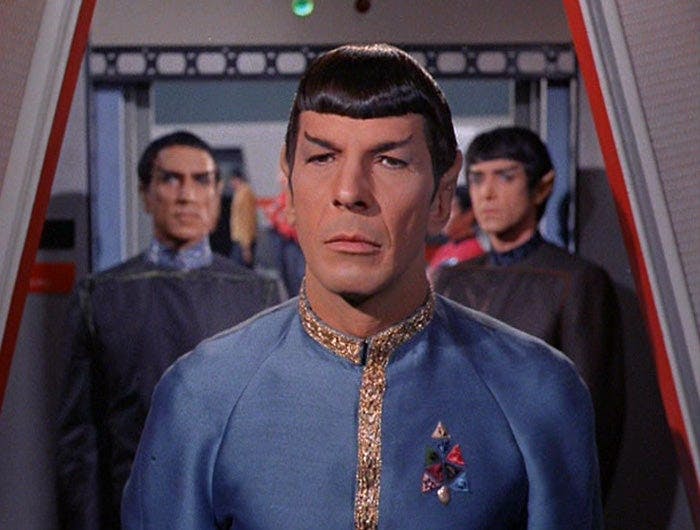
StarTrek.com
Though the Prime Directive speaks to the moral equality across societies, this notion is also upheld within human society, especially with computing technology. Computers are tools to enhance the human experience— they provide resources, information, and allow for scientific research and discovery more broadly. Since there is no money and no greed, all technology is open source and available to all. Computers are strictly prohibited from being used for nefarious purposes, such as for autonomous weapons of mass destruction, which are built on other planets as seen in The Next Generation’s “The Arsenal of Freedom”.
Arguably, the one character who represents the ideal communist role model is Mr. Spock. He repeatedly reminds Captain Kirk that the needs of the many outweigh the needs of the few (such as in “Space Seed” and in The Wrath of Khan). His sole interest is in science and knowledge, and doing what is good for society and his fellow shipmates. He continually sacrifices himself each time a crisis arises, such as when he flies into a giant energy eating virus to discover its behavior in “The Immunity Syndrome.” In “Journey to Babel,” Spock refuses to give his own father a blood transfusion because he must command the Enterprise.
Is Such a World Obtainable?
Given the vision presented by Star Trek, it begs the question: is it feasible (putting aside the impossibility of things such as warp-speed travel)? Any future where technology produces such abundance that no one needs to work must still overcome some hurdles. The biggest one is still the need to link effort with reward. Capitalism succeeds because it efficiently connects the two. Work and investment generate income, which is then used to buy the things we want. On average, the more people apply themselves, the higher their incomes.
Socialist countries, which aimed to implement Marx’s vision, ultimately failed because of this problem. If the state guarantees the same resources to everyone, regardless of how hard they work, an entire society will be incentivized to provide minimal effort, which will generate a downward spiral.
In the Star Trek world, work is purely voluntary, since there is no money to pay wages or generate a return on investment. As Saadia points out in Trekonomics, the way to draw forth effort is thus to be “paid” by the respect of society and one’s peers — reputation is the new currency. This, however, is one of the most problematic features of Star Trek’s vision. In small-scale societies, it can work. Everyone knows everyone else, and the individual’s behavior is easily monitored. The loss of individuality is compensated for by deeper social ties.
But in a decentralized, individualistic society, with billions of people, the ability to draw forth effort must come with tangible rewards. In the future, work takes on only a handful of forms. First are the “hobbyists” who produce for personal pride and pleasure, such as Picard’s brother working the family vineyards. Next are those in the rarefied high-skill or high-tech world, like Starfleet officers, who can gain satisfaction in completing their missions and moving up in rank.
But the need to empty the septic tanks on the Enterprise will likely remain. Here we return to the incentives problem. Either society develops a way to motivate this labor, or it exploits or enslaves a class of workers to do it. While robots could do it, they are banned on Earth in Star Trek. If robots are used for the dirty work, then there is still the possibility of an idle class, who may be susceptible to demagogues, seeking to divide humanity for their own selfish aims. We are then back to a dystopian future, so commonly depicted in science fiction.
Perhaps we need a new Star Trek series — another set of chapters in the history of economic thought that remains true to Roddenberry’s vision — to help fill in the gaps about how we can implement a society of peace, prosperity, joy, and fulfillment.
Jason M. Barr (he/him) is a professor of economics at Rutgers University-Newark. He is the author of Building the Skyline: The Birth and Growth of Manhattan’s Skyscrapers. He currently writes the Skynomics Blog. You can find him on Twitter at @JasonBarrRU.
